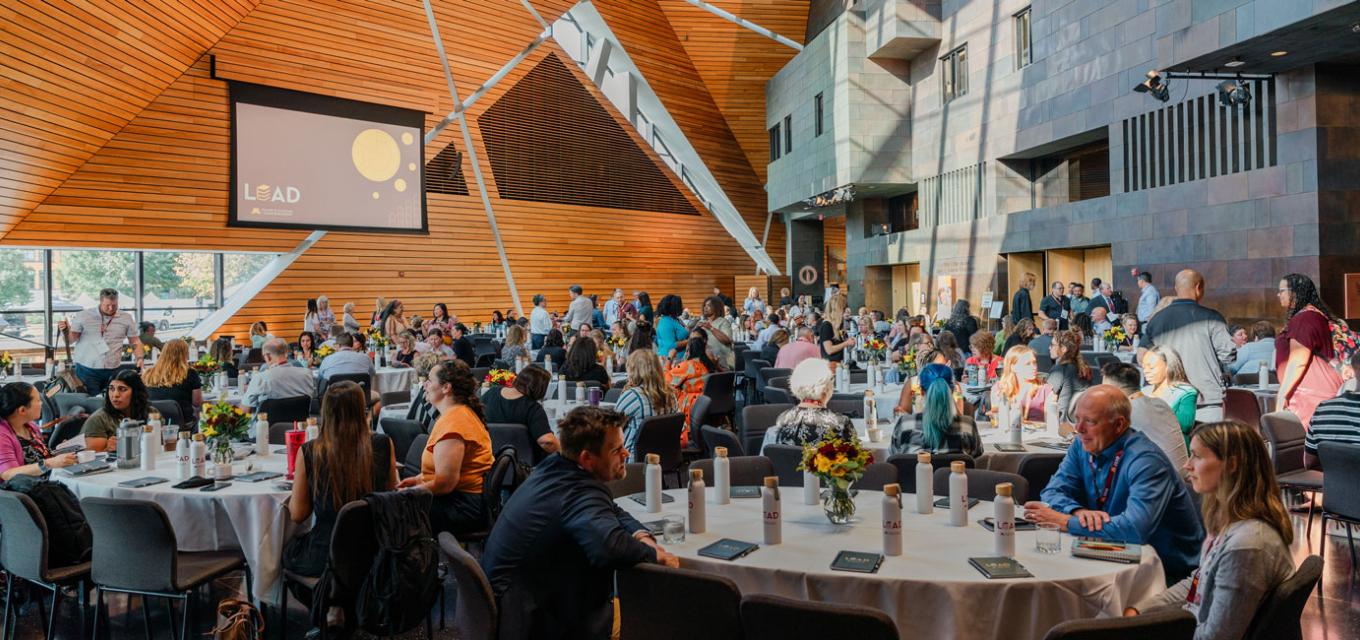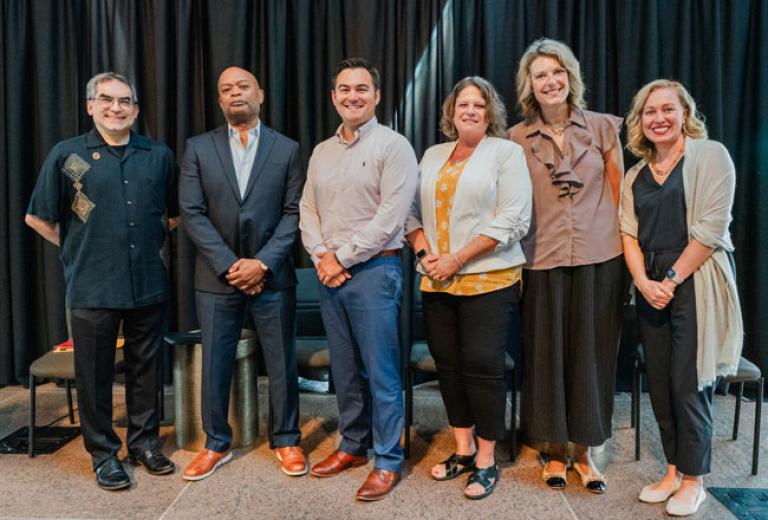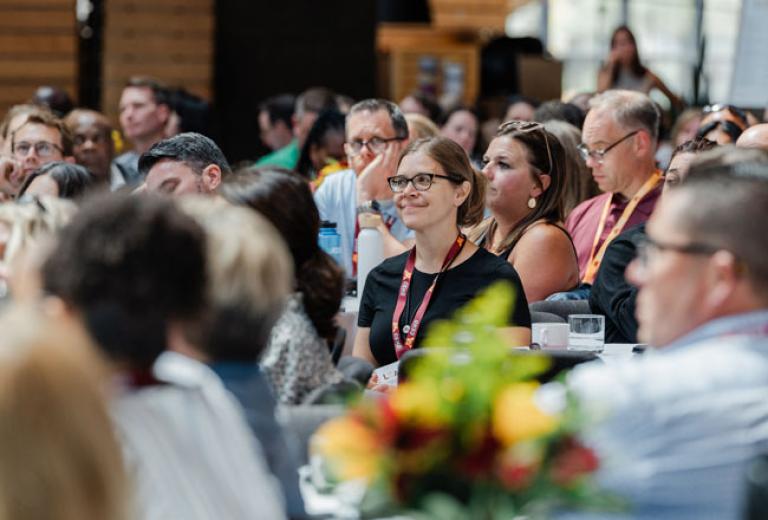News

‘A powerful experience’
2023 LEAD conference points the way to disrupting racial inequities in schools.
A sold-out crowd of more than 400 educational leaders from across the state packed the McNamara Alumni Center in early August for the second annual Leading in Equity, Action, and Diversity (LEAD) for PreK-12 System Improvement conference. Each one of those leaders walked away with the tools and commitment necessary to disrupt pervasive racial inequities in schools and improve student opportunities, experiences, and outcomes.
Attendees were treated to three keynote speakers this year. Leading off the two-day conference was Dr. Decoteau J. Irby, an associate professor at the University of Illinois Chicago. In “Getting Past Stuck: Organizing Schools to Eliminate Racism,” Irby focused on three key components: Racial Equity Improvement, Organizational Capacity, and Leadership Practice. To “move the school toward its preferred future,” all three elements are necessary and it’s necessary that they are working together. You cannot disrupt radicalized systems and create more expansive opportunities without having the resources available to do so.
Kareem Weaver, the co-founder and executive director of FULCRUM, presented “The Quiet Parts Out Loud: Politics, Assumptions, and Literacy Growth.” In this keynote, Weaver recognized the conference was about equity, but he said he wanted to challenge the audience a bit and push its thinking. “You probably won’t hear too much from me about equity,” he said. “It’s not the end all be all. Without excellence, your equity doesn’t matter. That’s like me being in the back of the bus and you being three steps ahead of me and we are going over a cliff. We’ve got to get the bus on course and then we can talk about disproportionality.”
Weaver said excellence is compelling. It’s gripping. “It does something to the spirit,” he said. “If that’s not part of the standards, then the whole thing is a con game.”
Dr. Darrius Stanley, an assistant professor in the Department of Organizational Leadership, Policy, and Development at CEHD, gave the final keynote on day two: “Community Engaged Leadership: A Call to Action for Educational Leaders.” He explained to the audience what he meant by community. “It’s about looking outside the door to see your greatest resources,” he said.
Stanley cited Barrow Hill School in Leon County, Florida. It was a school self-sustained by the Black community. The land was donated by a nearby church, area carpenters built it, and local mothers cooked the food. “It is an example of how a village can lead a school space,” he said. “How were they able to prepare and educate people? How did they make it happen? Because the resources existed in the community.”
Sessions run the Gamut of Educational Equity
In addition to the keynotes, attendees had 16 breakout sessions to choose from, as well as a legislative roundtable featuring Minnesota Commissioner of Education Willie Jett, Representatives Heather Edelson and Cheryl Youakim, Senator Zach Duckworth, and Kim Gibbons, the director of the Center for Applied Research and Educational Improvement.
The breakout sessions had something to offer everyone. Those interested in math instruction checked out Department of Curriculum and Instruction (C&I) Associate Professor Lesa Clarkson with former C&I grad student and now assistant professor at the University of Wisconsin Osh Kosh, Fawnda Norman, at “An Equity and Excellence Framework for Mathematics” on day one and/or “Eighth Grade Algebra? YES!” on day two. Currently, Minnesota is the only state that requires algebra in eighth grade, but many students struggle because they were not properly prepared. “The kids aren’t failing, the system is failing,” Clarkson said. She offered some strategies for educators, including knowing what the current standards and benchmarks are and evaluating the curriculum and resources regarding those standards.

Literacy educators found an intriguing topic with Department of Educational Psychology Assistant Professor Kirsten Newell’s session on “Reading Screeners for Bilingual Learners.” Reading screeners are assessments on how a student is progressing in reading skills. Unfortunately, most of them are not ideal for bilingual students. Publishers don’t have a financial reason to create materials for those learners, Newell explained.
“I would advocate for schools to create their own materials,” she said. “They can start by finding a passage or book in that target language and have kids read it and see how they are doing.” Educators could also take a page from Stanley’s presentation and seek resources from the community. “Get some parent experts in that language and community and get language samples from that,” Newell suggested. “Let’s build our own norms.”
In 2021, Minneapolis became one of the first public school districts to require an ethnic studies course as a graduation requirement. In “What Students and Science Say about Ethnic Studies,” Minneapolis Public Schools Assistant Principal Lisa Purcell, K-12 Social Studies and Ethnic Studies Content Lead Brandy Siddiqui, Institute of Child Development (ICD) research fellow Elizabeth Fajemirokun, ICD doctoral student Mirinda Morency, and ICD doctoral candidate Sarah Gillespie discussed Project UNITE, designed to gauge students’ identity development, academic achievement, and well-being in the wake of the new course requirement. “We found a number of positive impacts,” Gillespie said, and among these “students were much more inspired to embrace diversity.”
More information about Project UNITE, as well as a Racial Identity Development Toolkit for Teachers is available online (tinyurl.com/ridkit).
Feeling inspired
For attendees, the 2023 LEAD conference gave them a wealth of ideas for their schools. “In the climate we live in, it’s good to be surrounded by so many excellent equity leaders and thought partners,” says Delon Smith, the director of equity and innovation at Roseville Area Schools. “The keynote speakers were knowledgeable, engaging, and helped confirm the direction our district is heading. I leave this year’s conference with concrete ideas on how to further engage our students so we can do as Whitney Houston has instructed, ‘teach them well and let them lead the way.’”

“The LEAD Conference was full of excitement, positive energy, and a collective commitment to identify viable ways to meet the needs of learners across the state of Minnesota,” says Lisa Sayles-Adams, superintendent of Eastern Carver County Schools.
Roseville Area Schools Assistant Superintendent Melissa Sonnek called the conference a powerful experience. “As I walked into the room, I was struck by the number of educational leaders, whom I deeply respect, from across the state all gathered in one place to learn together,” she says. “It is a testament to the high-quality learning provided to practitioners. I left feeling inspired to lead in equity, action, and diversity. My hope is if the LEAD conference does what it intends to do, years from now across the state of Minnesota no identity marker, especially race, will be a predictor of achievement.”
Photo credits: Marjan Samadi
-KEVIN MOE